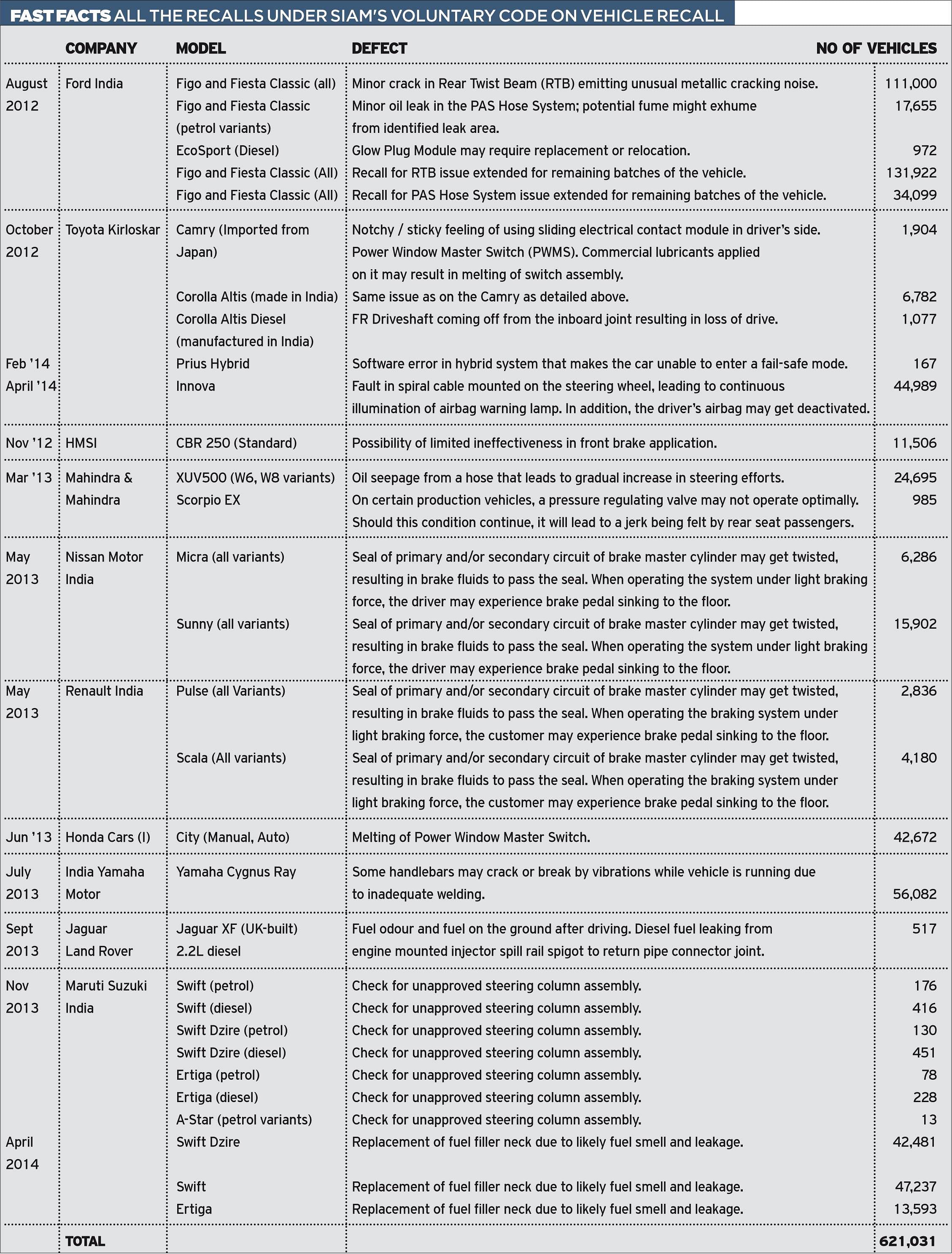Vehicle recalls in India cross half-a-million mark under SIAM code
The recall of nearly 45,000 Innovas by Toyota on April 9 took the cumulative total of vehicles recalled in India under the Society of Indian Automobile Manufacturers' (SIAM) Voluntary Code on Vehicle Recall to over 500,000 vehicles.
The recall of nearly 45,000 Innovas by Toyota on April 9 took the cumulative total of vehicles recalled in India under the Society of Indian Automobile Manufacturers' (SIAM) Voluntary Code on Vehicle Recall to over 500,000 vehicles. And with the latest recall of 103,311 Marutis (comprising 42,481 Dzires, 47,237 Swifts and 13,593 Ertigas) – on April 11 by Maruti Suzuki India, that figure has crossed the 600,000 mark. The SIAM Recall code came into effect on July 2, 2012.
Some of these recalls are part of a global exercise. These recalls were made by 10 OEMs – eight four-wheeler OEMs and a couple of two-wheeler makers (see detailed listing below).
In the four-wheeler space, the OEMs include mass market leader Maruti Suzuki on one end and luxury carmaker Jaguar Land Rover on the other. The biggest recall so far was by Ford India, which included a cumulative 295,000 units which includes three models – Figo, Fiesta Classic and EcoSport. Jaguar Land Rover is the first luxury carmaker in the list of OEMs to have recalled vehicles after SIAM’s code came into effect.
In India, there is yet to be a law by the government that makes recalls mandatory, in case of any technical snag. But SIAM's voluntary recall code has paved the way to a structured vehicle recall exercise in India. It also reflects OEMs’ proactive efforts to address technical issues in their vehicles, as is the industry practice in the West.
In an earlier interaction with Autocar Professional regarding the recall, Dr Wolfgang Ziebart, director, Group Engineering, Jaguar Land Rover, had said: “In our case it is very simple. If you have an issue, you must be instantly, completely transparent not to hide anything as the outside world will discover everything. Either you are open, or you are lost.” JLR had recalled vehicles under both brands.
Before the code kicked in, another luxury carmaker, Mercedes-Benz had recalled cars in India. The company says in a statement, “Mercedes-Benz India follows a pro-active voluntary recall policy which is in line with Daimler’s global recall policy. This is aimed at extending the maximum satisfaction to the customers. In the past there have been selective minor recalls, wherein voluntarily customers had been intimated and the necessary jobs were performed.”
Compared to matured markets in North America and Europe, India is far behind in terms of consumers’ experience with vehicles. Therefore, a recall in India should be handled differently than a recall in the US or Germany. Mohit Arora, executive director of global marketing information services firm JD Power and Associates, says: “In developed markets like the USA, customers have been exposed to multiple recalls across various brands that they may have owned over a period of time as most customers are repeat buyers. In developing markets like India, where more than half of the customers are first-time buyers, a lot more sensitivity and customer communication will be necessary.”
“If there is a problem, the OEM should come out in the open. A recall can help improve the brand confidence,” says Jagdish Khattar, CMD, Carnation Auto and former MD of Maruti Suzuki.
Regarding the exercise of recalls, Arora adds that while one-off recall events may be perceived positively by customers as a reflection of continued customer care from an OEM, repeated issues from the same make are likely to shake the confidence of existing customers and prospective buyers.
That shouldn’t be the case in India as JD Power’s surveys indicate that in general there is an improvement in the overall quality of vehicles, across brands, over the past several years.
In the coming years, India may also get a mandatory recall policy. It is understood that the Ministry of Heavy Industry has constituted a core group under the Inter Ministerial Group on Auto Recall and End of Life to look into the same.

RELATED ARTICLES
Cosmo First diversifies into paint protection film and ceramic coatings
The Aurangabad, Maharashtra-based packaging materials supplier is leveraging its competencies in plastic films and speci...
JSW MG Motor India confident of selling 1,000 M9 electric MPVs in first year
The 5.2-metre-long, seven-seater luxury electric MPV, which will be locally assembled at the Halol plant in Gujarat, wil...
Modern Automotives targets 25% CAGR in forged components by FY2031, diversifies into e-3Ws
The Tier-1 component supplier of forged components such as connecting rods, crankshafts, tie-rods, and fork bridges to l...






 14 Apr 2014
14 Apr 2014
 4249 Views
4249 Views








 Autocar Professional Bureau
Autocar Professional Bureau




